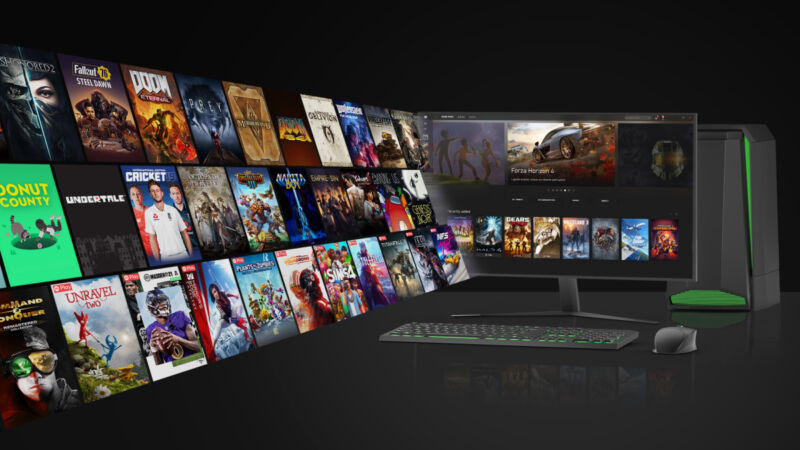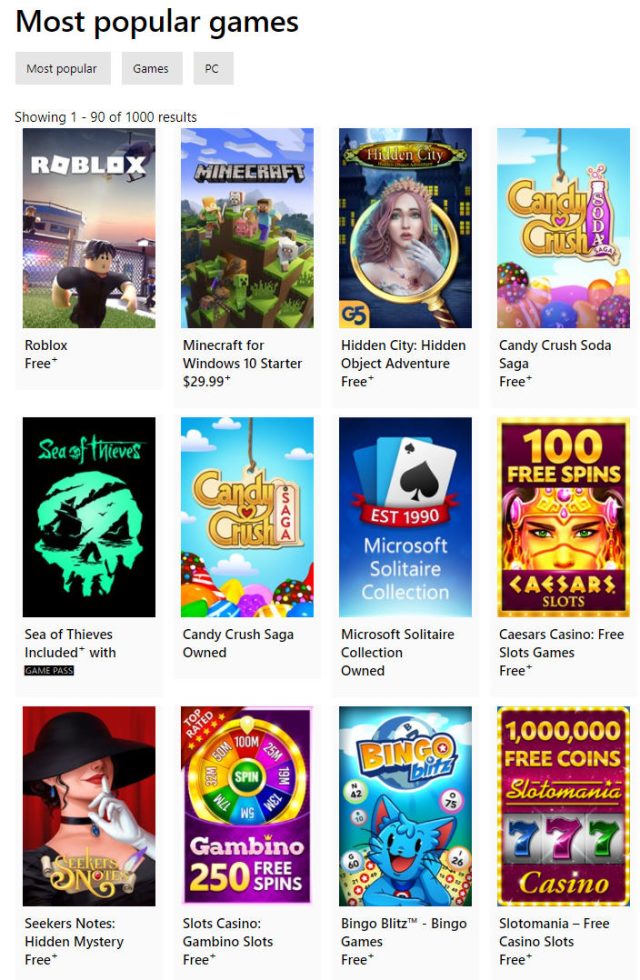

Microsoft follows Epic’s lead, lowers its cut of PC game sales to 12%
source link: https://arstechnica.com/gaming/2021/04/microsoft-follows-epics-lead-lowers-its-cut-of-pc-game-sales-to-12/
Go to the source link to view the article. You can view the picture content, updated content and better typesetting reading experience. If the link is broken, please click the button below to view the snapshot at that time.
Competition at work —
Microsoft follows Epic’s lead, lowers its cut of PC game sales to 12%
But the move may not be enough to dislodge heavily entrenched competition.
Kyle Orland - 4/29/2021, 5:31 PM

Microsoft is lowering the revenue cut it takes on games sold through its Microsoft Store on PCs from 30 percent to 12 percent, marking a new front in its uphill battle to take on competing game distribution platforms like Steam and the Epic Games Store.
"Having a clear, no-strings-attached revenue share means developers can bring more games to more players and find greater commercial success from doing so," Microsoft Head of Game Creator Experience and Ecosystem Sarah Bond wrote in an announcement post. "All this to help reduce friction, increase the financial opportunity, and let game developers do what they love: make games."
The new rate, which goes into effect on August 1, seemingly applies to games specifically and not to the general entertainment and utility apps that are also sold on the Microsoft Store platform, based on the language in the announcement. The change also doesn't apply to game development across the Xbox console ecosystem, where Microsoft will still take a 30 percent cut (as do other major console makers).Stiff competition
On consoles, of course, Microsoft relies on that 30 percent cut to make up for losses incurred on the sale of hardware. And on the Xbox, Microsoft is in the enviable position of being in full control of the only legitimate method of distributing downloadable games to customers (a similar situation to the one causing legal headaches for Apple and its iOS App Store).
On the PC, by contrast, Microsoft's downloadable game store faces stiff competition from multiple competing platforms—as well as the ancient practice of gamers just downloading EXE files. And while there are some big-name titles currently available through the Microsoft Store, the platform's selection of games is currently dominated by a lot of lowest-common-denominator shovelware.

Advertisement
Microsoft's revenue-sharing move comes over two years after the Epic Game Store launched on PC with its own 12 percent revenue cut and could put additional pressure on Steam to lower its standard 30 percent cut (though that number comes down a bit for best-sellers and doesn't apply to Steam codes sold via third-party stores). Then again, Epic has only clawed its way to a roughly 15 percent share of the PC gaming marketplace (as estimated by Epic CEO Tim Sweeney last June) by throwing huge sums of money at developers for timed exclusives and free game giveaways.
Thus far, Microsoft hasn't shown interest in making similarly aggressive plays for exclusives on the Microsoft Store. Even many of Microsoft's own Windows games, which would seem like ideal candidates for ways to get gamers interested in the Microsoft Store platform, are also offered on Steam these days, seemingly as a practical necessity.
Yes, a more generous revenue-sharing arrangement may convince some developers (and players, by extension) to try out distribution on the Microsoft Store. But if the large majority of potential players stick to Steam—where their friends, achievements, existing game libraries, etc. are already well established—then having a larger cut of a smaller market might still end up being a losing proposition for those developers.
The Microsoft Store stumbled a bit with game developers at first because of the initial requirement that all apps on the platform needed to be developed using the more restrictive Universal Windows Platform standard, which still has its fair share of issues. By the time Microsoft started allowing standard Win32 desktop apps in the Store in late 2016, the damage had largely been done for some skeptical members of the gaming community.
"The risk here is that, if Microsoft convinces everybody to use UWP, then they phase out Win32 apps," Epic's Tim Sweeney said in 2016. "If they can succeed in doing that, then it's a small leap to forcing all apps and games to be distributed through the Windows Store."
Microsoft's move to improve its revenue-sharing agreements for PC games shows the company knows that it needs to do something to fix the Microsoft Store's reputation with gamers and developers. But that move alone may not end up being sufficient to dislodge the more entrenched players in the PC gaming space.
Recommend
About Joyk
Aggregate valuable and interesting links.
Joyk means Joy of geeK